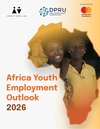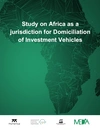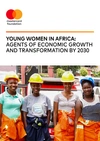Incorporating Transferable Skills Training into Secondary and Vocational Education in Africa
Our newest report, Skills at Scale: Transferable Skills in Secondary and Vocational Education in Africa, examines how Africa’s growing population of youth offers an incredible resource for socioeconomic transformation and growth. Governments of many African countries are bringing transferable skills training (such as financial literacy, communication, teamwork and problem-solving) into their formal education systems to enhance the job-readiness of their young people. This in-depth, case study examination was commissioned by the Foundation and undertaken by the African Institute for Development Policy to look at how the integration of transferable skills training was done in Rwanda, Kenya, and Nigeria.
Youth represent an energetic and resourceful demographic that, with the right education and skills, will be a force contributing to productive economies in Africa. Currently, there are approximately 220 million youth in Africa between the ages of 15 and 35. An estimated 11 million young people will enter the job market every year over the next decade. It is critical that secondary, vocational and tertiary institutions prepare students for the workplace and/or for self-employment. Transferable skills are highly valued by employers and enhance an individual’s ability to earn a living. Transferable skills have been shown to be correlated with improved outcomes in school, life, and work, yet until recently have not been integrated within formal educations systems on the continent.
The report offers insights and lessons for governments, implementers, donors, and education experts, as similar efforts are undertaken in other countries and regions. We hope this report will contribute to the broader dialogue on practical approaches to increasing the relevance of education, and for supporting youth in their transitions to sustainable livelihoods.




